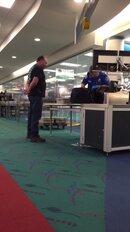
When it comes to traveling nowadays, the rules are ever changing. It seems like there is a constant state of confusion on what you can pack and carry on when flying as the TSA is regularly tweaking the rules to respond to differing scenarios that occur in the world and the travel industry. So, what’s the traveling SCUBA diver to do to ensure a hassle free security check and travel experience? Well, there are three things I do whenever traveling regardless if I’m traveling to dive or for another reason.
- Check the TSA website- they have a neat little tool called “Can I Bring It?”. This tool allows you to search particular items and get information on whether or not you can carry it on or have to check it with your luggage. In addition, this tool features security wait times at various airports, airport status, and general guidelines.
- Check your particular airline’s website- While most airlines have rules and regulations that parallel those of the TSA, sometimes there is a conflict. The last thing you want to happen at the airport is to get caught up in one of these conflicts. Pay particular attention to carry on size limitations, oftentimes these are based on the particular aircraft being used(smaller aircraft=smaller carryons in general). Don’t just trust the little “box” at the security checkpoint to see if your carry on is within the limitations.
- Have a plan in place for flexibility-As the rules are ever changing, the savvy traveler will have a plan in place to allow for changes at the airport. As an example, I carry a small packable duffel bag in a pocket in my main carry on. In the event that a carry on I thought was good to go turns out to have to be checked, I pull out that duffel and put the items I need for the flight(and the event my checked luggage is lost) into it. That way I check my original carry on and still have the crucial items that I need in hand.
What The TSA Generally Says About SCUBA Gear
According to the TSA website:
“You may bring regulators, buoyancy compensators and masks, snorkels and fins as carry-on or checked baggage. Knives and spear guns are prohibited from carry-on luggage. These items should be packed in checked luggage. Please see additional guidance below.
Compressed gas cylinders are allowed in checked baggage or as a carry-on ONLY if the regulator valve is completely disconnected from the cylinder and the cylinder is no longer sealed (i.e. the cylinder has an open end). The cylinder must have an opening to allow for a visual inspection inside. Passengers considering air travel with a compressed air or CO2 system would be advised to contact its manufacturer for guidance in locating a qualified technician, or to consider shipping the system to their destination via a parcel service.
Please sheath or securely wrap any sharp objects you pack in your checked luggage to prevent it from injuring baggage handlers and security officers.
Even if an item is generally permitted, it may be subject to additional screening or not allowed through the checkpoint if it triggers an alarm during the screening process, appears to have been tampered with, or poses other security concerns. The final decision rests with TSA on whether to allow any items on the plane.”
While those guidelines seem a little vague, it generally says that your personal dive equipment can be carried onto the aircraft-subject to size limitations. Just remember, you can rent cylinders and weights at your dive destination.
Skip The Long Security Lines-Get Pre Check!
The TSA has a program that allows trusted travelers to receive expedited security screening and skip the long lines. While this program isn’t available at every airport or with every air carrier, it is available with most of the larger ones. So for a small fee and a quick in person appointment you can travel a little easier. Check out the details HERE!
Whatever your travel plans are, just remember that the team at DRIS has the SCUBA gear and advice to make your dive destination experience an epic one. So give us a shout and talk dive travel!





